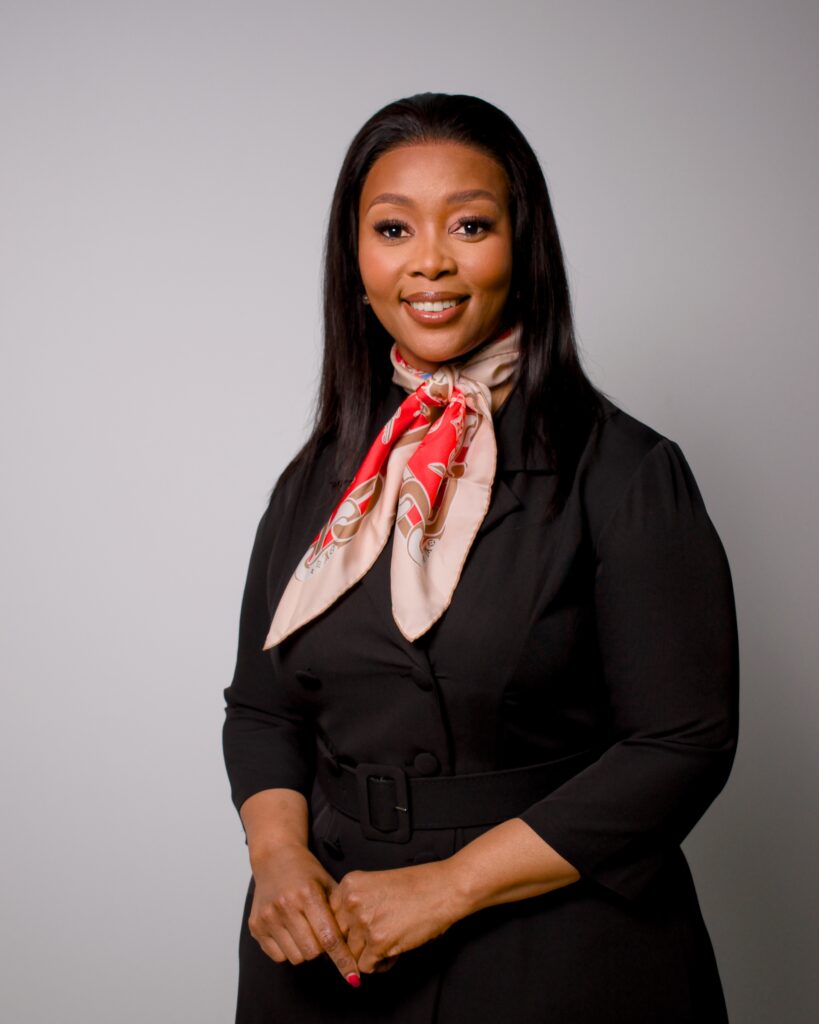Insurance Sector Education and Training Authority (INSETA) Chief Executive Officer (CEO) Gugu Mkhize is a multi-award-winning business leader under whose tutelage the organisation has bagged the global Best Insurance Training Institute Award.
Since her almost four-year tenure as CEO, Mkhize has personally won multiple awards including Business Leader of the Year, Global CEO of the year in Insurance Training, CEO of the Year from the World Business Outlook Awards, Legend of Empowerment Award by Top Empowerment Companies, Business Leader 2023 from the Institute for People Management as well as the Public Sector Leader of the Year from Standard Bank Top Women Awards.
These awards are a true affirmation of her leadership prowess which, according to her, centres around “leading from the heart and empowering those around you.”
Besides being a talented leader – as seen from the accolades she received from various quarters including both the private and public sectors – Mkhize is a seasoned business leader with expertise amassed through working in various fields including construction and home building regulation, project financing, education and skills development, project management and corporate consulting.
Some of the key leadership roles Mkhize previously held include Executive: Corporate Services (National Home Builders Regulatory Council), Chief Executive Officer (Excelle International Pty Ltd), Executive Manager: Corporate Services (Mining Qualifications Authority), Senior Manager: Corporate Services (Johannesburg Social Housing Company) and Senior Corporate Manager (KZN Growth Fund Managers).
Mkhize’s diverse work experience has enabled her to navigate her career with humility and resilience whilst dealing with multiple stakeholders across various levels of the various organizations.
Some of the skills she has acquired in her professional travails include strategic leadership, corporate governance, human capital development policies and strategies, strategy and policy development, stakeholder relations, strategic business planning and organizational performance.
BBQ spoke to Mkhize discussing a variety of issues including her leadership style, her vision for INSETA, skill development (which is the organisation’s key focus) women empowerment and the much-needed transformation in the insurance industry as it is in other such critical sectors.

Could you share the key milestones in your career and education that have significantly influenced your approach to business leadership?
Gugu Mkhize: The foundation of my career has been my educational background and being intentional about continuous learning in my leadership journey. The cumulative experience I have acquired has seen me achieving many milestones both personally and for the organisations I have worked. Some the milestones include ground-breaking innovations which contributed to elevating the previous organisations brands.
In my current role, one of the highlights of my leadership is the Insurance Sector Student Fund which has benefited many young people who had dreams of being in tertiary institutions but no means to fund their education. This is first of its kind and innovative initiative aimed at enabling young people (especially from disadvantaged backgrounds) to acquire critical and future skills enabling them become part of the digital revolution that the country and the world at large is going through. This initiative is driven by an understanding that the world as we know has been completely altered. Every sector must rethink the kind of skills required currently and in the future.
In 2022 we implemented a mentorship and skills transfer programme named the Retirees and Repurposing Programme – wherein retired industry professionals mentor and transfer skills to upcoming insurance professionals. This is run in partnership with the South African Insurance Association (SAIA) and Insurance Institute of South Africa (IISA). This multi-layered skills development programme targeting managers and executives. The programme also promotes the transformation of the insurance sector by increasing the pool of professionals from disadvantaged backgrounds. Our target is also to support 2000 leaders in leadership programmes by 2026.
Leadership development in the insurance industry is key and we have geared programmes as a contribution to the transformation of the sector for the employees who come from historically disadvantaged backgrounds. We are in partnership with higher education institutions to deliver multiple leadership programmes so that we can reach and exceed our target above. The objective remains ensuring a comprehensive transfer of technical knowledge and leadership skills, thereby enhancing the participants’ professional development. The programme is also aimed at imparting leadership skills enabling the participants to become effecting leaders with the ability to deal all kinds of work environments.
How has INSETA’s operational strategy evolved this year, and what key performance indicators are you focusing on to measure success?
Gugu Mkhize: Our journey to excellence has been marked with many “highs” as well as some lows. This is part of an evolving organisation, and we have embraced the changes with the intention of promoting brand INSETA. Our strategy is anchored on the recently launched Excellence Model which is founded on four pillars, namely, mandate, people, systems and impact.
The People pillar relates to internal and external stakeholders who are the force behind the achievement of whatever milestone the organisation sets itself for. Mandate is about the organisational core functions that define the organisation’s reason for existence. Systems are about an enabling infrastructure for operational excellence. Impact relates to the lives touched and transformed by the value the organisation creates.
The cultivators of our Excellence Model are Recognition of Employees; Peer to Peer Recognition; Communication and Feedback as well as Awards (Recognition).
We are conscious that the value proposition of our entity must benefit the insurance industry and the financial services sector. The success of our strategy is measured through the impact we make to our beneficiaries. During the last financial year 2023/2024, we impacted 17,696 beneficiaries in our programmes.

Which strategic objectives have been essential for INSETA this year, and what strategies are in place to address any upcoming challenges?
Gugu Mkhize: Our enabling strategies for INSETA’s mandate include, but are not limited to, rural development, digital inclusion, supporting transformation through leadership programmes, promotional of insurance through career guidance, technical insurance skills support and worker programmes as well as the support we offer to Small Medium Micro Enterprises.
These strategies are implemented in partnership with our skills delivery partners. With the high levels of unemployment in the country, we remain committed to support unemployed youth and aspiring entrepreneurs, however, sometimes it is impossible to provide the necessary funding due financial constraints. We continuously are pursuing alternative sources of funding to increase our revenue to overcome this challenge.
What strategies does INSETA employ to strengthen stakeholder relationships?
Gugu Mkhize: Our stakeholder engagement strategy focuses on sector specific engagements to ensure alignment with the ever-changing demands of skills. We have segmented our engagements to address specific issues relating to compliance, application processes, product knowledge, research and innovation. Our engagements strengthen the relations with a myriad of stakeholders in the financial services sector. Engaging our stakeholders is central to the supply and demand of skills. Our strategy is also driven by our understanding of how critical stakeholder engagement is when it comes to strategic planning. This is because it is important that our stakeholders understand why we exist, where we want to go and how we are going to get there. Furthermore, it’s essential that our key stakeholders are aligned with and buy into our strategic direction. This way they can become advocates of our vision and mission.
In addition, our stakeholders could have a wealth of relevant knowledge and experience that as strategic leaders may want to take into consideration to help us be more impactful and viable in the long-term. What all this means is that–with stakeholder needs changing and the conventional way of working, the future of INSETA lies in achieving a deeper understanding of our stakeholders, operational excellence, digitisation of skills development and adapting to the industry’s shifting talent needs. As INSETA we will need to initiate robust stakeholder engagement to align the needs of the sector with the skills agenda in the insurance sector. We must make the sector attractive to the youth, and the current workforce, and build an adequate talent pool for the future.
What are the core competencies that set INSETA apart in the industry, and how do you leverage these strengths to achieve business growth?
Gugu Mkhize: We are an organisation of many “firsts”, this is evident in the eight accolades that INSETA has been awarded. We strive for excellence, innovation, and continuous learning. We have introduced rural programmes for unemployed youth, funding opportunities for fin-tech and insure-tech innovations, we have introduced a digital innovation hub model which seeks to establish a digital footprint provincially to allow unemployed youth to acquire digital skills. We currently have edutainment film which has been shown to more 10,000 high school learners about the top 10 insurance careers. A pilot project for capacitating claims management and administration employees in drone technology will be implemented during the current year. Our skills strategy will continue to be responsive as technology shifts and changes the face of some occupations.

As South Africa celebrates 30 years of democracy, what role do you believe INSETA should play in promoting equity and inclusion within the industry?
Gugu Mkhize: INSETA has a responsibility to ensure that the principles of equity and inclusion are deeply embedded in every aspect of the insurance sector through skills development. Our initiatives contribute to increasing access to education and training for historically disadvantaged communities, ensuring that our programs are accessible to all. Our focus is on advocating for policies that support the representation of diverse groups within leadership roles in the industry, reflecting the democratic values of our nation. Whilst there is still a lot to be done, we must be proud of the significant inroads that our young democracy has brought from people coming from disadvantaged backgrounds. Furthermore, about 76% of the beneficiaries of our programmes are below 35 years of age and we are intentional about supporting the unemployed youth.
What lessons from South Africa’s journey over the past 30 years can be applied to leadership and governance at INSETA?
Gugu Mkhize: “South Africa’s journey teaches us the importance of resilience, inclusivity, and the power of collective effort in overcoming challenges. For INSETA, these lessons are applicable in that the organisation has undergone significant changes which have fostered a culture of resilience and agility. Some valuable lessons for us have been the deliberate creation of a leadership culture that is transparent, accountable, and committed for continuous improvement. The engagement with stakeholders has been our main priority to promote open dialogues.
Reflecting on the transformation of South Africa’s insurance sector over the past 30 years, how do you plan to continue driving positive change and transformation within INSETA?
Gugu Mkhize: “The rate of transformation in South Africa’s insurance sector has been particularly slow, and an aggressive approach must be adopted to realise real transformation. Under my leadership, INSETA is well positioned to drive skills development that responds to transformation imperatives and inclusivity of many marginalised communities. It is also important that focus is made to the technical insurance skills, compliance skills as well as the digital skills as the industry is changing at a rapid pace because of the technological changes.
On the other hand, INSETA must continuously consider future platforms we build, and develop transformation plans that extend across functions. Our success depends on being more responsive in skills development through building effective partnerships.
Having said so, I fervently believe, my contribution to the organisation and the support I have enjoyed from the Board and our stakeholders, has accelerated many innovations and new skills initiatives for the industry. I remain committed to ensuring that the organisation transforms inside out, to position INSETA as a skills development leader through research and innovation, responsive learning programmes and excellent execution.
Personally, transformation continues to remain high on my agenda. I believe leveraging the strength of diversity will ensure business success.
As INSETA approaches its future, how would you like to see the organization contribute to South Africa’s legacy of democracy and development in the next decade?
Gugu Mkhize: I envision INSETA contributing to South Africa’s legacy of democracy and development by being a leader in promoting social equity and economic empowerment through skills development within the insurance sector. Over the next decade, I would like to see INSETA spearheading initiatives that address the skills gaps in underserved communities, supporting small and medium enterprises in the insurance industry, and advocating for policies that ensure the sector remains inclusive and representative of all South Africans. I look forward to seeing INSETA being recognized not just as a training authority, but as a champion of transformation and development in our democracy.”
How would you ensure that INSETA actively promotes gender equality and empowers women within the organization and the insurance sector as a whole?
Gugu Mkhize: Since inception, INSETA has built its brand on gender parity, inclusivity and support especially in support for women and persons with disability. Our programmes support more than 65% of women, we have special projects focusing on training the youth and persons with disabilities. Our very own organisation employs 71% of women and we introduced the mentoring and coaching programme to empower aspiring women leaders. Furthermore, we have women in leadership programmes aimed at accelerating the career paths of women in the industry. Through our partnerships with the industry employers, we have funded countless programmes to support women.
What initiatives would you introduce to support work-life balance for women at INSETA, particularly those balancing professional and family responsibilities?
Gugu Mkhize: “Supporting work-life balance is crucial for retaining and empowering women in the workforce. We have introduced a remote working policy which allows our employees to work from home when the need arises. We have recently introduced an INSETA School Programme which will support beneficiaries in primary, senior primary and high school. Furthermore, we take health and wellness very seriously in our organisation and have made some inroads in supporting our workforce. Looking into the future, there are some additional support mechanisms that we will introduce to retain and reward our employees.
Research has shown that maintaining a healthy work-life balance is not only important for health and relationships, but it can also improve employees’ productivity and ultimately performance. Put simply, if your people don’t view work as a chore, then they will work harder, make fewer mistakes and are more likely to become advocates for your brand. Work-life balance is about effectively fine-tuning the scale weighing work demands and personal responsibilities like, health, family, hobbies, self-care and relaxation. For us women juggling the demands of one’s career and personal life can lead to high stress levels, negatively impacting our mental and physical health. It is therefore important to achieve the balance between work and life. This allows us to navigate the challenges of our profession while safeguarding our well-being.
According to research achieving that balance can benefit us by: minimizing work-related stress; improving productivity; enhancing decision-making and (most importantly) building and maintaining personal relationships. Achieving a work-life balance also allows us–as women leaders- to allocate time for family, friends, and social activities, fostering meaningful connections, vital for a fulfilling life.
Such research also shows that when a woman leader actively practices a healthy work-life balance, the impact on the company can be transformative, influencing various aspects positively. As the research posits – embracing work-life balance is not only about personal fulfilment – it’s about reshaping the entire corporate ecosystem.


How would you address the challenges that women face in the insurance sector, such as gender-based discrimination or harassment?
Gugu Mkhize: Addressing gender-based challenges requires a proactive and zero-tolerance approach. At INSETA, we have created a safe culture and will continue to create awareness for our employees on issues of gender-based discrimination and harassment. We have a sexual harassment policy which is widely communicated to employees and the hotline for reporting such incidences. Furthermore, we embrace our diversity and unique abilities in the workplace in line with our corporate values of respect of professionalism, respect and accountability.
There are ,however, sociologists who argue that the most effective way of ending gender discrimination is through mainstreaming women issues in whatever we do.
This includes the usage of gender-sensitive language and gender specific data collection and analysis. Creating structures wherein men and women are equally involved in decision-making instead of women being brought in as a special grouping.
This approach is in line with the United Nation’s adoption of gender mainstreaming as a global strategy for gender equality and women’s rights and empowerment. Most notably, the transformative potential of gender mainstreaming was reaffirmed in the 2030 Agenda for Sustainable Development with its call for accelerated implementation.
This was complemented by and explicit acknowledgement by the UN members states that sustainable development cannot be achieved in any area without gender equality and women’s rights and empowerment.
This new strategy is perceived as a way to move beyond the earlier fragmented “women in development” project-based approach towards a deeper and more sustained impact on development policy and practice. As part of this approach, the Handbook on Gender Mainstreaming for Gender Equality results has been developed with the aim to encourage and support more systematic and effective mainstreaming implementation for the achievement of gender equality and women’s empowerment throughout the United Nations system and within all sectors. It is intended for use by practitioners, policymakers, gender focal points and technical managers with various levels of awareness and knowledge of gender mainstreaming. It is also a resource for gender specialists and advisors, who play a critical role in guiding and mainstreaming for gender equality results.
When asked what her goals and vision for the future are Mkhize said, “Mr role will be meaningless if there is no impact to the stakeholders I serve. Leadership is about empowering others, it’s about lifting others and it’s about change that results from consistent efforts. I will continue to manifest authentic and courageous leadership.”added Mkhize.
Driving INSETA forward

